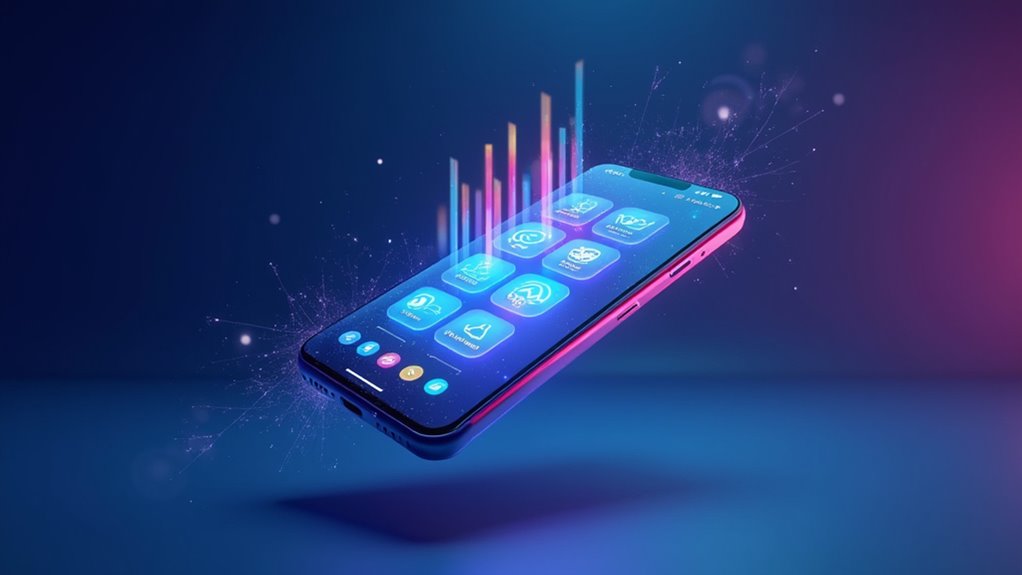ChatGPT dominates the AI landscape with a staggering 349 million monthly users—more than the entire US population. Competitors Doubao and Nova trail behind but are gaining ground fast. For creative professionals, DALL·E 3 and Midjourney lead in image generation, while business users rely on Clio for finances and Tidio for customer service. Writing assistants like Grammarly and Rytr continue to streamline content creation. The numbers don’t lie—these AI tools are revolutionizing how we work.

As artificial intelligence continues to revolutionize our digital landscape, a handful of standout apps have emerged as essential tools for millions worldwide. The AI app trends of 2025 show ChatGPT dominating with a staggering 349.41 million monthly active users—that’s more people than the entire population of the United States! User engagement metrics reveal Doubao and Nova following behind with 78.61 and 56.6 million users respectively.
You’re probably using at least one of these already, aren’t you?
The download numbers tell an equally impressive story. ChatGPT racked up 250.1 million downloads in 2024 alone, while Google Gemini and Chinese-developed Doubao weren’t far behind. Don’t sleep on Nova either—with 31.7 million downloads, it’s quickly becoming the dark horse in the AI race. In the competitive US market, ChatGPT maintained its dominance with 31 million downloads in 2024.
Creative professionals have embraced tools like DALL·E 3 and Midjourney for image generation. Need a video but hate filming? Try Synthesia to transform your text into professional-quality footage in minutes.
Canva Magic Studio has revolutionized graphic design, making everyone suddenly capable of creating stunning visuals. No design degree necessary!
Writers rejoice—Grammarly continues to save careers one embarrassing typo at a time, while Rytr and Jasper handle everything from email drafts to full marketing campaigns. Research Rabbit has become indispensable for academics by creating citation graphs that visually map connections between related papers. Research just got easier with Semantic Scholar cutting hours off citation work. Trust me, your bibliography will thank you.
The education sector hasn’t been left behind. Socratic helps students actually understand their homework (rather than just copying answers), while Jenni AI transforms research papers from nightmare to manageable task.
Financial management gets the AI treatment with Clio, which analyzes spending patterns faster than you can say “where did my money go?”
Businesses leverage collaboration tools like tl;dv and Avoma to make meetings productive (finally!), while Tidio AI handles customer service inquiries 24/7. Marketing teams have adopted AI-powered platforms that deliver predictive analytics to anticipate customer behavior and optimize campaign performance automatically.
Data analysts are flocking to Julius AI, combining sophisticated analysis with plain-English insights. The future isn’t coming—it’s already installed on your phone.
Frequently Asked Questions
Are Free AI Apps as Effective as Paid Versions?
Free AI apps can be effective for basic needs, but research shows the free vs paid divide impacts user satisfaction considerably.
Free versions typically offer limited features and may include ads, while paid options deliver enhanced functionality, dedicated support, and better security.
For casual users, free apps might suffice; serious professionals often find paid versions worth the investment.
How Much Data Do These AI Apps Collect From Users?
AI apps typically collect substantial user data, from basic demographics to detailed behavioral patterns. User consent is often buried in lengthy terms of service—good luck reading those!
Data transparency varies wildly between apps; some merely check compliance boxes while others provide detailed control panels. Free apps generally collect more data than paid versions (surprise, surprise!).
Can AI Apps Work Offline Without Internet Connection?
Yes, many AI apps can work offline through local AI processing.
Modern offline functionality allows apps to run neural networks and LLMs directly on your device—no Wi-Fi required! This approach offers serious perks: enhanced privacy (your data stays put), faster performance (no waiting for server responses), and the freedom to work anywhere.
Apps like Pieces, Scrivener, and even Canva Pro now offer compelling offline AI capabilities that don’t sacrifice power for portability.
What Security Measures Protect Personal Information in AI Apps?
AI apps protect personal information through several security measures.
Modern encryption standards shield data during storage and transmission, making it unreadable to unauthorized users. Access controls restrict who can view sensitive information. User consent mechanisms guarantee people actually know what data they’re sharing (shocking concept, right?).
Privacy by design principles, adherence to regulations like GDPR, and transparent data processing policies round out the security package.
How Often Are These AI Applications Updated With New Features?
AI applications typically follow varied update cycles depending on their category. General assistants like ChatGPT refresh every few months, while generative models undergo continuous development.
Chatbots receive updates almost monthly to improve conversational flows. Feature frequency is often driven by competitive pressure and user feedback.
These regular updates aren’t just for show—they enhance functionality, fix bugs, and integrate new technologies. The most successful AI tools maintain aggressive update schedules to stay relevant in the rapidly evolving market.









